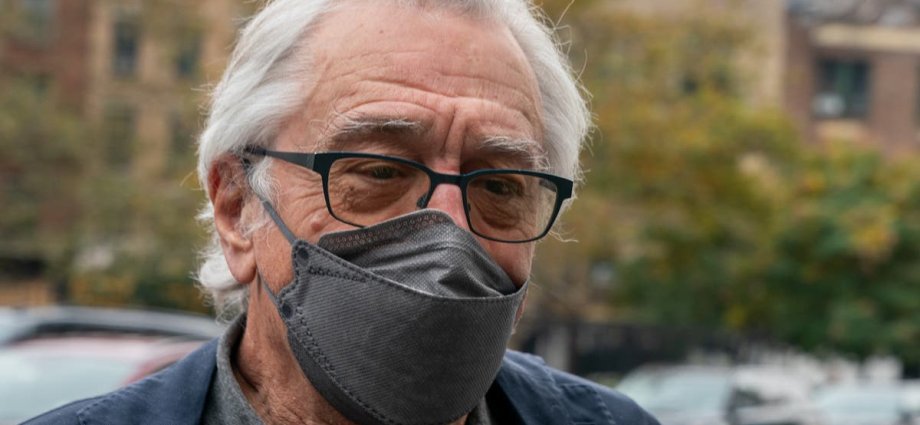Shame on you!” shouts the grizzly, bespectacled man from the witness box. His voice is gruff with age and hoarse with indignation. Perhaps he rises out of his seat in passion, or maybe he shakes a fist in the air. Sitting across from him in that Manhattan courthouse is a woman, the subject of his ire. Millions of dollars are at stake. Reputations are on the line. It’s a scene worthy of a Netflix courtroom drama – even more so thanks to the A-list celebrity in the lead role. Only this time, he isn’t in character.
Robert De Niro, the aforementioned grizzly man in the witness box, really did shout “shame on you” across a New York courtroom yesterday afternoon, swiftly followed by a muttered apology to the judge presiding over his highly publicised civil trial. The two-time Oscar winner, 80, is being sued by his former executive assistant and vice president of his production company, Graham Chase Robinson, for $12m (£9.8m) in damages for severe emotional distress and reputational harm. Robinson claims he was an abusive boss. De Niro denies the allegations (“nonsense”) and is suing Graham for $6m (£4.9m), accusing her of spending vast sums of company money on her own travel and food. Graham also stands accused of “loafing during work hours, and binge-watching astounding hours of TV shows on Netflix”.
Since beginning testimony earlier this week, De Niro has, according to every reporter present at the trial, been irate. He has been angry, shouty, cantankerous, annoyed, dismissive, and snappy. “Pissed off,” is how TMZ put it. After one particularly “testy exchange” between himself and one of Robinson’s lawyers, the judge was forced to step in and remind De Niro – and the lawyer – not to raise their voices. While it is tempting to say that this courtroom behaviour has shown the world a different side to the much-loved actor, has De Niro not always been the quintessential grumpy old man of Hollywood?
With career-defining turns in films like Goodfellas, Casino, Taxi Driver, and most recently Killers of the Flower Moon, across six decades De Niro, perhaps the best actor of his generation, carved a reputation for himself as a loner; a tough guy; a grey-haired grouch even before he actually went grey. (There is a whole article dedicated to his “Best Curmudgeon Roles”.) Off-screen, too, this persona persists. De Niro is famously not the type to suffer fools – whether said fool is Donald Trump (of which the typically monosyllabic actor is an uncharacteristically loud critic) or a seemingly well-meaning but confused reporter.
In 2015, De Niro made headlines after storming out of a Radio Times interview due to its “negative inference”. According to journalist Emma Brockes, De Niro took issue with a question – “How is it that you manage not to be on autopilot?” – before he asked her to turn off the recorder, got up from his seat and began “madly” pacing about. “All the way through. Negative inference. The whole way through and I’m not doing it. I’m not doing it, darling,” De Niro told Brockes before sticking his head out of the door to find someone to escort him out of the room. For her part, Brockes later said she felt “sympathy” for De Niro who was understandably “grumpy and knackered” after a long day of interviews but criticised his “hostility and condescension”.
That same year, De Niro had choice words for the CEO of Flickr and Slack when both were in attendance at the Wall Street Journal Innovator Awards. Tech mogul Stewart Butterfield took the stage, remarking on the “supermodels and movie stars” filling the audience while he accepted the “nerd award”. “We are a long way from San Francisco,” he said, before addressing De Niro directly: “I watched Godfather II on the plane … when you killed Don Fanucci, I liked that.” De Niro was evidently unimpressed by the apparently light-hearted comments. Taking the stage after Butterfield, he said: “Whoever the last speaker was … I thought you were a bit condescending to us actors … celebrities. I’m gonna go on record with you just to say that. And I don’t give a f*** who you are.” All of this – his preference for privacy, short fuse in interviews and willingness to call people out – has coalesced into an overall image of De Niro as Hollywood’s crotchety patriarch.
The allegations made against De Niro are a mixed bag, ranging from the eccentric to the concerning. (The court heard that he once asked Robinson to Uber him a “particular” martini from the ritzy Nobu sushi lounge at 11pm.) On the other end of the spectrum are claims of “gratuitous unwanted physical contact” such as the actor allegedly asking Robinson to scratch his back. When she asked him to use a back-scratcher instead, she said that he responded: “I like the way you do it.” De Niro admitted that he may have made the request once or twice but “never with disrespect or lewdness”. It was this specific allegation that prompted the “shame on you” blow-up; De Niro appeared most troubled by the suggestion of any sexual indiscretion on his part.
“At times, De Niro would flatly deny something, only to later admit that there might be truth to it in a manner different to how it was suggested,” writes Larry Neumeister of Associated Press. One example might be the actor’s proclamation that he was “never abusive, ever”. It’s a declaration that is dependent on one’s definition of the word as later De Niro concedes he might have called Robinson a “b**** to her face” and admitted that on one occasion, after she had failed to remind him of an important California meeting, he had “berated” her and possibly called her a “brat”.
Robert De Niro speaks onstage at the American Icon Awards at the Beverly Wilshire Four Seasons Hotel on May 19, 2019 in Beverly Hills, California
(Getty)
On allegations that he rang her twice while she was at her grandmother’s funeral (because he wanted her to buy his teenage son a bus ticket), the actor, as quoted by the BBC, replied: “So?” Asked about claims that he required Robinson to be always available to do “anything and everything” (including decorating his Christmas tree and mending his clothes), De Niro told the court: “I asked her to do anything within reason. Within the confines of her job. It’s not like I’m telling her to go out and scrape floors, so this is all nonsense.” He dismissed claims that he urinates while on the phone to her (“Give me a break!”)
De Niro has always been a grumpy old man (the perma-frown is no doubt part of his schtick and his appeal), but this trial lifts the veil a little further on the actor, and reminds us what a seemingly innocuous descriptor (like grumpy) can mask – something meaner at play, perhaps.











